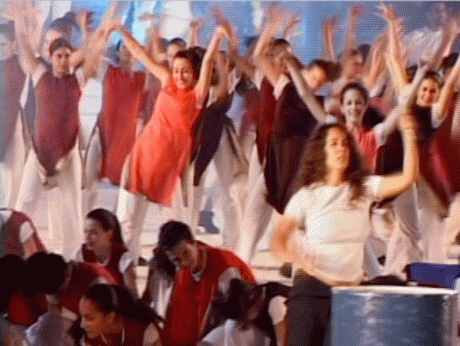Birthright Israel mega-rally
A documentary by Alan Snitow and Deborah Kaufman
This documentary presents a powerful and evocative discussion at the personal level of the changing and challenging nature of Jewish values in the United States. Outside of the Jewish community, for anyone interested in Palestinian-Israeli issues, and Middle East issues in the broader context, it is a must see film. There is no resolution to the documentary, it is an expression of exploration and discovery of Jewish beliefs and the unresolved divisions of the shifting boundaries of identity for the Jewish people in America.
The personal explorations of the directors begins with the Jewish Film Festival in San Francisco and the showing of a film about Rachel Corrie, which became the centre of controversy over what was to be shown as representing Judaism - in a pro or anti Israeli dialogue - at the festival. From that beginning, the big question concerns the divisions within the Jewish community: who decides what being Jewish is all about, from the extremes of accepting anyone who self-identifies as a Jew or to the orthodox view of Jewish matrilineal inheritance.
Very familiar themes rise, familiar to those who have been reading arguments about the Israeli-Palestine question from all sources. The concept of demographics and the Jewish population is not explored in depth but arises twice in significant references. This is exemplified in the life of Dr. Bernard Kaufman, whose own family included Muslim converts and radical social activism. His "final blessing" was of accepting change, yet at the same time remaining torn within his own militant Zionist beliefs.
The holocaust theme is ubiquitous in all Jewish references, having "replaced the exodus as the orienting myth" of the "master narrative" of Jewish history. Two diverse views rise within this discussion, that which supports the necessity of a strong, independent state that counter arguments say abuses others and has become "small, tribal, and insular."
This discussion centres on the Wiesenthal Centre and its Museum of Tolerance, one of which is planned for Jerusalem on an ancient Palestinian grave site. The argument for the centre is that the world needs to remember the holocaust, to grow towards tolerance; the argument against it is "We can't do it [desecrate the grave sites] if we expect the world to treat our cemeteries with respect." The discussion continues with a look back at the liaisons between Jewish values and the workers social movements of the 1930s in the United States. Out of this discussion rises the statement that "radical action against injustice is also a kind of Jewish continuity."
These themes and others are all internal within the Jewish community itself. The speakers and situations presented all concern those within the Jewish faith. The internal divisions are about how to present and react to the concerns of the Jewish people and how that has an impact on Israel and the United States. It is about real people reacting to the changing world around them, the memories and transitions of the earlier generations, and the questioning and seeking of the current generation.
This is an excellent film presenting the current state of Jewish thought in the United States. The discussion of values - Jewish values that are not necessarily exclusively Jewish - needs to be seen in order that the discussion can be brought to the awareness of those not directly within the Jewish community.





